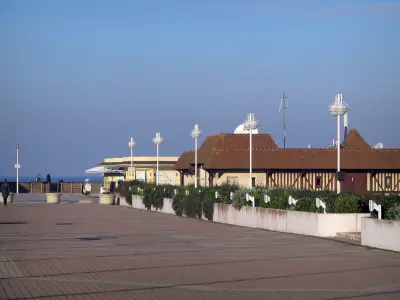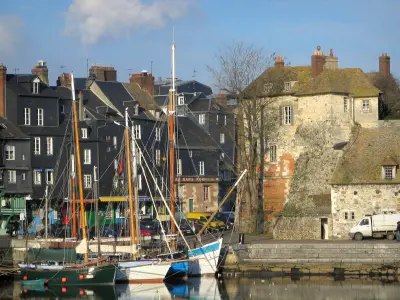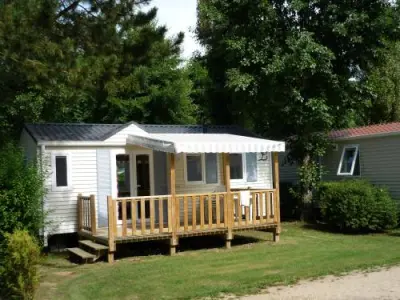A city that comes to the past and present. Somewhere in Normandy, Pays d'Auge, near the Côte Fleurie is a city in unexpected happened. Touques, once political and economic augeron heart beating to the rhythm of its port, is now a charming town delicately colored flowers. Overshadowed by the popularity of her neighbors in the mid 19th century, the village now city breathes again and communicates through its monuments and its facilities, its rich history. A story that transpires in the Pays d'Auge last twenty centuries.
Gallo-Roman ... It is in the 1st century AD back as the first traces of human occupation on the site Touques. Nineteen fragments of Gallo-Roman pottery, found in 1997, show the romanization of Normandy and particularly the estuary Touques at this time (archaeological diagnostics front of St. Peter's Church by Eric Mare). In this valley "V" carved into the ice age and clogged with silt that up to twenty-four meter thick Touques then the last village before the estuary. Its name, of Celtic origin, meaning "wood supply, especially forest, clearings between" recalls the immense forest that will cover the Pays d'Auge until the 17th century. Contemporary mythical city of Portus Niger (ancient Roman port of Lisieux) Touques began a long development which will accelerate after the Scandinavian invasion ...
The first Normans ... Severe and bloody battle between the early 10th century the kingdom of France Charles the Simple to the third Northmen led by Rollo (Hrolf in Scandinavian). The latter, although defeated, gets in exchange for his conversion to Christianity and his submission to the king, part of Neustria (Treaty of Saint - Clère - sur - Epte, 911). Founder of Normandy, Rollo immediately committed to the protection of his duchy. He launched an extensive program of fortification its borders. It prevents other Vikings enter lower Seine. Touques seen rising on the neighboring hill, the first wooden palisades of the future castle that will control the entire estuary Touques. Before the wanderings of the river and not far from the sea, the city is also the ideal place for a port. In addition to its proper close environment Touques fits perfectly in the Norman system based around the cities of Caen and Rouen. What was once a small village before the arrival of Scandinavian and maritime policy becomes the heart of the Pays d'Auge north. A side of the city that already has ten centuries Thorulf (Trouville) Thorgisl (Tourgéville) and Knappi (Canapville) only see the day. At the beginning of the reign of William the Conqueror, Touques is already a powerful city ..
William, King of England and Duke of Normandy born the illegitimate union between Robert the Magnificent and Herleua (Arlette), Guillaume, nicknamed the bastard will change Normandy. Robust, smart, he thwarts the many conspiracies that disturb his youth since he succeeded his father, who died in Crusade (1035). Become William the Conqueror, he was crowned king of England after his victory at Hastings in 1066. Anxious to maintain order in his duchy, he regularly inspects it, landing at Touques, then went back to England by Barfleur Cotentin. Moreover, both Norman towns become the two major Channel ports Anglo-Norman system ... When William died in 1087, he left behind a solid and perfectly administered Touques kingdom which is a major metropolises. His successor and youngest son, William Rufus returned in 1099 to quell the revolt against his authority Mans. In 1112, during the reign of Henry I, Touques is the scene of the trial of one of the most formidable enemies of the king. City coveted Geoffrey Plantagenet, Count of Anjou, went there in 1119 to lay siege to the castle and and seize the fortress that locks the port and valley. It fails! Prosperity follows the growth and Touques appears briefly as the first seaport and second medieval city of the Pays d'Auge ...
Living in the court of Henry the second: it is under the reign of Henry Plantagenet 2nd Touques that reached the pinnacle of his political life. The powerful king of England Loves reside: not only can he go hunting through the forest full of game covering the valley, but it also can effectively control his duchy remaining close to the major cities of Normandy. It takes a very brilliant court between 1176 and 1179 if we judge by the expenditures of the role of the board whose meetings, as the court are made to Touques. Richard Coeur de Lion, his son, decides on his accession to the throne of England, the reconstruction of the castle so regularly occupied.
The dark hours of the Hundred Years War: after more than a century of economic softness and political calm, Touques finds himself deep into the heart of the Hundred Years War. In 1346, Edward III, King of England lands in the Cotentin. It ravaged Normandy before heading north and Crécy where he won a landslide victory over the French. Meanwhile, ships follow the coastline and killing all ports that have participated in the construction of the fleet battle Lécluse. Touques, which provides five galleys is looted and burned ... The parishes surrounding the castle must then provide men to watch. The former summer residence of the bishops of Lisieux becomes a powerful fortress. In 1417, Henry V, King of England, arrives in Touques: accompanied by 10,000 men, he destroyed the town and besieged the castle surrendered after a few days. British Touques returns until 1449. The end of the Franco-British conflict leaves long Touques tired. But if the castle finally fell into disuse, the port, he will now know his finest hour ...
A port with an international vocation: "know that between Ouistreham and Antree of Saynne, there is a bay and in this bay there is a haven called Touques". Garcia Ferrande; Major road and steering fifteenth.
Since the 11th century, the port is the vector of growth of the city. New business opportunities created by the Renaissance give it another dimension. Both platforms (St. Peter and St. Thomas), although totaling 12,000 m², are not enough to store the goods. Shipyards, in turn, build ships up to 500 tons as the Saint-Pierre! Using extremely solid wood, they have an excellent reputation. A third platform further upstream to Tourgéville is called the dock at the Cock and shipyards are building yachts up to 120 tons. He disappeared in 1844. Wearing Touques is almost entirely export-oriented (98% of its business). Wood and local produce (apples, cider, Calvados) represent the majority of outputs. The remaining 2% was spent on the importation of rare materials in the Pays d'Auge (tiles, slates and stones among others). The destinations are multiple. Vessels leaving Touques well as navigate to Caen, Le Havre, Rouen that to England, Spain, Newfoundland and Brazil (it enters the harbor on average 250 to 300 boats per year until the late 18th century). This is certainly the international impact of port Touques justifies that the city is on a map of France drawn in 1576 by Italian Stefano Buonsignori ("La Francia" exposed card at Palazzo Vecchio in Florence).
A day on the docks: true anthills, docks see mingle haulers, drivers, boatmen, carpenters, sawyers, coopers, customs brokers, and a master dock. What are their functions? Haulers have a difficult and exhausting task: they pull the boats back up Touques. They borrow what is called a towpath. Pilots attending captains to lead ships into or out of the estuary Touques. They are for the majority of Trouville.
Gabariers down these heavy flat boats that carry the Auge agricultural production to Touques background.
Dependent on the exploitation of the vast surrounding forest, carpenters and sawyers are assigned to the construction and repair of vessels attached to Touques. Coopers (24 in 1804) enjoy exporting cider and Calvados. With approximately 130,000 hectoliters of cider per year pass through Touques, their presence is essential. Customs dock master directly dependent of the Admiralty. The first control the goods while the latter ensures the police docks and cash rights input and output port. It is also responsible for lights and beacons and regularly inspects the funds of the river to see if they have not changed. The broker is responsible to find and negotiate the goods. Hired by the owner, his services are not required. However, they avoid long hours of research and negotiations captains. Respected Admiralty character, the broker is also useful to set some conflicting slightly upstream docks Touques situations, we find the largest existing bascule bridge since at least the 11th century. With a mobile central arch, it allows ships to go back to the dock at Rooster Tourgéville. For the cross, its users must pay a toll used by its owners, the bishops of Lisieux, to fund maintenance. The continual decay of the bridge seems to indicate a certain negligence of the bishops whose attendance is often questioned.
Nineteenth and twentieth, recession and revival: the disappearance of the port in the middle of the 19th century immersed Touques in a slow but prolonged economic desertification. The city lost its status as the leading metropolis of the estuary, overtaken by its neighbors, Trouville and Deauville. Private income, the municipality only provide for the maintenance and development of the town without incurring serious debt ... Fortunately, over the 20th century, Touques recovers. The new town hall (1914), imposing, symbolizes the will of the city to find a time forgotten importance. From 1970 Touques saw its population increase dramatically. In the early 21st century, the old town has 3,800 inhabitants. Today's renewed dynamism is expressed through its various manifestations, its many shops, restaurants and hospitality its large capacity that contribute to its tourism and economic development. Touques now exceeded 4,000 people.




























